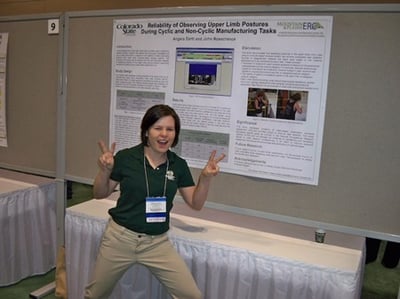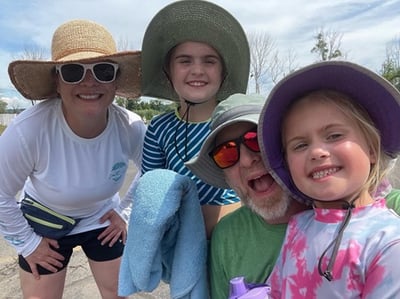Our center stands on three pillars: Research, Education, and Practice. One of the many ways we work to protect workers is through educating and training future leaders in occupational safety and health (OSH). We support trainees in OSH disciplines across six programs through the Mountain & Plains Education and Research Center (MAP ERC). She is also currently Chair of the MAP ERC External Advisory Panel.
As part of our Alumni Spotlight series highlighting our graduated trainees, we interviewed Angela Dartt, PhD, CIH, director of chemical safety at Washington University in St. Louis, part of the Department of Environmental, Health and Safety.

How did you find yourself in the field of occupational health and safety? Or what piqued your interest in studying this field?
I think like many of us, it wasn’t a singular event that sparked my interest in health and safety. I didn’t have a guidance counselor or industry professional in my life who pushed me in this direction. In the moment, my end point seems a bit random. However, when given the perspective of more than a decade of practicing the art and science in the field, it wasn’t random. I was accepted in a summer internship in radiation safety. I learned that opportunities spring from action. The following school year, building on the summer internship, I began working in health physics where I met a health physicist who graduated from Colorado State University and me being Missouri born, raised, and schooled (Go Mizzou!), the idea of going to Colorado for graduate school was too exciting not to consider. She told me about CSU, the health physics program and this other program, a program that I had not previously heard, two words joined together in a sequence that I was not previously familiar with, a program called industrial hygiene and the rest is history!
What attracted you to the MAP ERC program?
I like to think that the MAP ERC was actually attracted to me! Ha! I happened to be an existing graduate student in the CSU Environmental Health program and a NIOSH Training Grant recipient at the time the MAP ERC was formed. I was wrapping up my master’s program and knew that I wanted to continue my studies. I had a great advisor and amazing mentors at Colorado State University, so it was an easy decision to continue my education in the newly formed MAP ERC.
What lessons did you learn by working with classmates outside of your program field in the MAP ERC?
 Soft skills. Leaders must appreciate the knowledge and experience of their team when attempting to achieve a shared outcome that stretches into multiple fields of study. The MAP ERC’s requirement that I learn with and from students outside my primary field has broadened my field of vision so that I may more completely understand the breadth of a problem. The solution we seek when viewed from a single occupational health and safety lens may lack the expertise of perspectives from occupational physicians, industrial organizational psychologists, health physics, or ergonomists, or toxicologists. We must appreciate that our view of the problem, often despite our best effort, may be myopic. We need to widen our gaze. I’m not entirely confident that I would recognize that effective problem solving requires diverse views and having grown in the multidisciplinary education model that the MAP ERC requires, I am now well aware and prepared to lead the way.
Soft skills. Leaders must appreciate the knowledge and experience of their team when attempting to achieve a shared outcome that stretches into multiple fields of study. The MAP ERC’s requirement that I learn with and from students outside my primary field has broadened my field of vision so that I may more completely understand the breadth of a problem. The solution we seek when viewed from a single occupational health and safety lens may lack the expertise of perspectives from occupational physicians, industrial organizational psychologists, health physics, or ergonomists, or toxicologists. We must appreciate that our view of the problem, often despite our best effort, may be myopic. We need to widen our gaze. I’m not entirely confident that I would recognize that effective problem solving requires diverse views and having grown in the multidisciplinary education model that the MAP ERC requires, I am now well aware and prepared to lead the way.
What is your current role/how does it apply to your training or field of study in OSH?
I am the Director of Chemical Safety at Washington University in St. Louis, within the Department of Environmental, Health and Safety. During my time in the MAP ERC, my coursework and research focus was in industrial hygiene and ergonomics, so my current position is directly related to my field of study in OSH. A lot of my focus is on the health and safety of personnel working in our research labs, clinics and facilities; however, I also get to focus on educating both undergraduates and graduate students on the field of OSH.
Were there major differences between what you thought your job would be/how you’d use your training when you were a student compared to your current role/responsibilities/career path?
A thousand times yes! I honestly thought I would continue conducting research or perhaps work for NIOSH early in my studies. However, after one of those chance opportunities, I began an internship in industry and quickly discovered my passion for applying health and safety in the field and the direct impact our work can have. When the company I was working at essentially imploded financially, I was approached about consulting. I had never considered being a consultant, but decided to jump in, and it resulted in a whirlwind of 8 years of traveling all over the US and overseas to practice OHS in a variety of industries I had never experienced nor considered. Now, I’m back in academia! It’s important to be open to change and new opportunities. Have the hard discussion you need to have with yourself and know when it’s time to move on to something different.
How has your current position impacted the larger body of workers, families, and communities?
In my current position, the primary impact is on researchers from all backgrounds. My role is to lead and empower my team to provide exceptional environmental, health and safety support to our customers. However, I think the largest impact is on the undergraduate and graduate students that we interact with because we have a higher likelihood of influencing their approach to safety and inclusion of safety in both their research and daily lives. Every day, we have the opportunity to educate someone on a particular hazard, how to assess those hazards and how to protect themselves from those hazards. Outside of my role at WashU, I am heavily involved in several professional organizations that focus on worker protections. I am extremely passionate about my volunteer work in these organizations. The sky is the limit when it comes to impacting workplace health and safety, so I encourage everyone to look for those opportunities in their communities and within professional organizations.
What advice would you give future OSH trainees?
 OHS is often a regulatory obligation for whatever company who pays you for your time. The fact that your employment will rarely directly increase your company’s profits means that you will work in a team that may not be fully staffed… ever… and so, you’ll have to learn how to maximize your impact. You must leverage the talents of others to fulfill your desired goals. You must inspire action! Don’t fuss with “to lead” or “to manage”. Inspire! So I encourage that you take the following in mind:
OHS is often a regulatory obligation for whatever company who pays you for your time. The fact that your employment will rarely directly increase your company’s profits means that you will work in a team that may not be fully staffed… ever… and so, you’ll have to learn how to maximize your impact. You must leverage the talents of others to fulfill your desired goals. You must inspire action! Don’t fuss with “to lead” or “to manage”. Inspire! So I encourage that you take the following in mind:
Be humble in your achievements – we are where we are through others – we rarely will ever work in a vacuum.
Be brave in your ignorance – be willing to ask questions – inspirational people are willing to accept the boundaries of their knowledge, accept the boundaries and then push them.
Be fearless of titles or rank – when necessary, don’t be afraid to speak truth to power in the name of employee safety.




%20(2).png)

